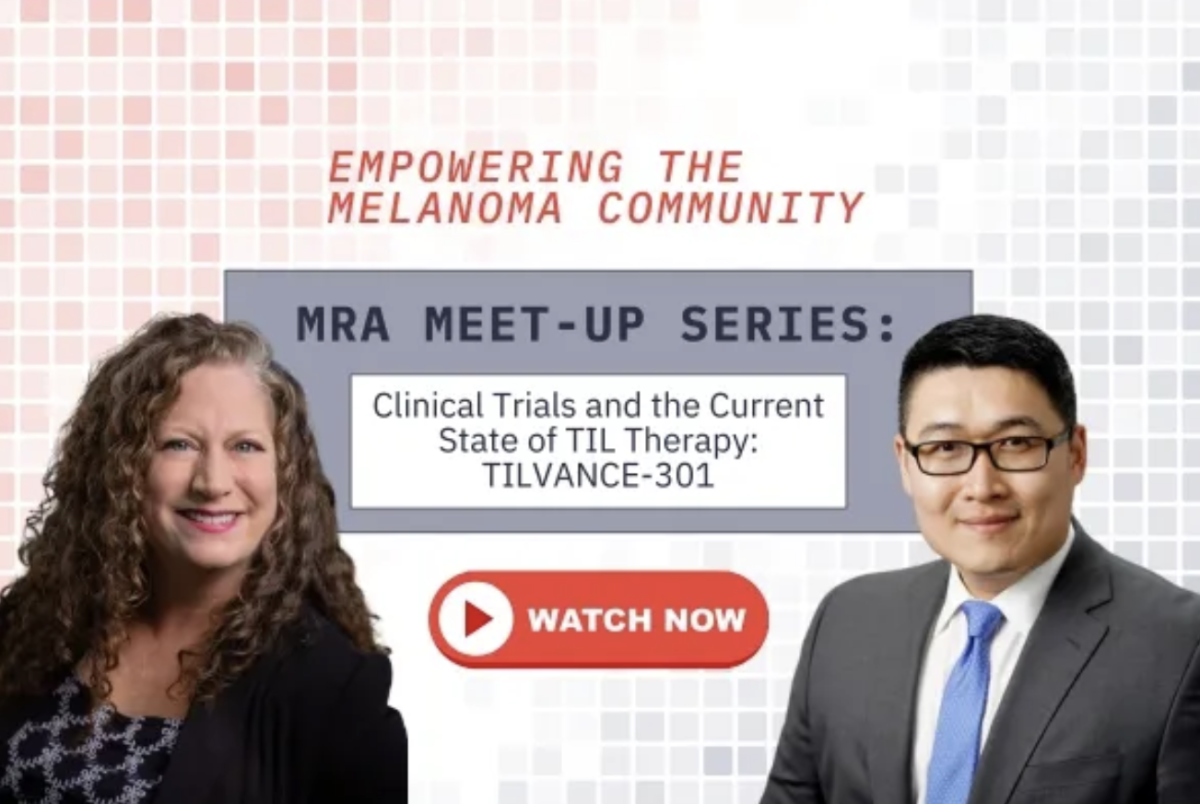MRA Meet Ups: Acral Melanoma Research Update
 MRA Meet-ups are a series of live webinars designed specifically to educate and empower patients and caregivers. Several with specific application for RARE melanomas are showcased below and full repository of recorded MRA Meet Ups can be found here.
MRA Meet-ups are a series of live webinars designed specifically to educate and empower patients and caregivers. Several with specific application for RARE melanomas are showcased below and full repository of recorded MRA Meet Ups can be found here.
The Melanoma Research Alliance’s (MRA) CEO, Dr. Marc Hurlburt hosted Dr. Boris Bastian, a leading melanoma researcher, from the University of California, San Francisco who presented an in-depth overview of the genomic differences between various types of melanomas, with a focus on acral and mucosal melanoma. He explains how melanoma arises from the accumulation of mutations in cells, often due to environmental exposures such as UV radiation, as seen in cutaneous melanoma, or possibly physical trauma, as in acral melanoma. Dr. Bastian explains that while cutaneous melanoma usually has small DNA changes caused by UV exposure, acral and mucosal melanomas often show much larger and more complex genetic changes—nicknamed “hail storms”—which may result from other environmental factors such as repeated physical stress on weight-bearing areas like the soles of the feet.
Dr. Bastian further discusses the challenges of treating acral and mucosal melanoma due to their lower mutation burden and genomic complexity, which makes them less responsive to immunotherapy compared to UV-induced melanomas. He emphasizes that these rare melanoma subtypes affect people of all ethnicities equally and are biologically distinct from cutaneous forms. The webinar concludes with a Q&A covering therapy responses, AI in genomics, gender-related mutation differences, long-term survivorship, and future directions for research and treatment.
Watch the full recording here: Acral Melanoma Research Update with Dr. Boris Bastian
MRA's Latest Research Report: Powering Progress Together
 The Melanoma Research Alliance (MRA) convened in February for its 2025 Scientific Retreat and Melanoma Exchange Patient Forum in Washington, D.C., bringing together more than 300 participants from across the melanoma community. One of the focus areas of the Retreat was advancing research and care for rare melanoma subtypes. In addition to several scientific talks on rare melanomas, MRA hosted a cross-sector industry roundtable, “Harnessing Collective Power for Rare Melanomas,” involving 35 representatives across industry, academia, and patient advocacy groups. This roundtable explored key issues for rare melanoma patients, including drug access, clinical trials inclusion, health insurance denials of melanoma therapies, and model development for advancing rare melanoma research. The meeting produced actionable strategies that are detailed in the 2025 MRA Retreat & Patient Forum Report.
The Melanoma Research Alliance (MRA) convened in February for its 2025 Scientific Retreat and Melanoma Exchange Patient Forum in Washington, D.C., bringing together more than 300 participants from across the melanoma community. One of the focus areas of the Retreat was advancing research and care for rare melanoma subtypes. In addition to several scientific talks on rare melanomas, MRA hosted a cross-sector industry roundtable, “Harnessing Collective Power for Rare Melanomas,” involving 35 representatives across industry, academia, and patient advocacy groups. This roundtable explored key issues for rare melanoma patients, including drug access, clinical trials inclusion, health insurance denials of melanoma therapies, and model development for advancing rare melanoma research. The meeting produced actionable strategies that are detailed in the 2025 MRA Retreat & Patient Forum Report.
The Melanoma Exchange Patient Forum featured a panel discussion moderated by MRA’s Dr. Joan Levy. Experts, with leading rare melanoma researchers, including Drs. Vito Rebecca, Kasey Couts, and Keiran Smalley. They shared their latest research efforts—from developing new model systems and understanding metastasis patterns, to studying tumor microenvironments and treatment resistance. These efforts underscore the power of collaboration and data sharing in unlocking new treatments for rare melanomas. MRA continues to support these efforts, including the forthcoming MRA Melanoma Biorepository, which will further enable rare melanoma research and collaboration.
Summaries of the talks and panels at the Retreat and Patient Forum can also be found in the 2025 MRA Retreat & Patient Forum Report.
Tumor Infiltrating Lymphocyte Therapy: Expanding a Patient’s Own Tumor-Fighting Cells to Generate a Long-Term Response in Advanced Melanoma
 Cancer immunotherapy, particularly immune checkpoint inhibitors (ICIs), has transformed the treatment landscape for patients with advanced melanoma. While many have benefited, a significant portion of patients do not respond or eventually experience disease progression, highlighting the need for new options. One promising approach is tumor-infiltrating lymphocyte (TIL) therapy, a personalized, cell-based immunotherapy that harnesses a patient’s own immune cells to target and destroy melanoma tumors. Some patients treated with TIL therapy have experienced long-lasting or even curative responses.
Cancer immunotherapy, particularly immune checkpoint inhibitors (ICIs), has transformed the treatment landscape for patients with advanced melanoma. While many have benefited, a significant portion of patients do not respond or eventually experience disease progression, highlighting the need for new options. One promising approach is tumor-infiltrating lymphocyte (TIL) therapy, a personalized, cell-based immunotherapy that harnesses a patient’s own immune cells to target and destroy melanoma tumors. Some patients treated with TIL therapy have experienced long-lasting or even curative responses.
Lifileucel (Amtagvi) is currently the only FDA-approved TIL therapy for patients with unresectable or metastatic melanoma whose disease has progressed following ICI and, when appropriate, targeted therapy for BRAF mutations. Ongoing research aims to expand its use, including the Phase 3 TILVANCE-301 clinical trial, which is evaluating TIL therapy in the first-line setting in combination with pembrolizumab (anti–PD-1) for patients with newly diagnosed metastatic melanoma. This trial seeks to assess whether the combination can improve response rates and durability of treatment while maintaining safety. The trial includes cutaneous, mucosal and acral melanoma patients who meet the eligibility criteria.
In a recent interview with MRA, Dr. Stephanie Goff of the National Cancer Institute emphasized both the promise and complexity of TIL therapy. She highlighted its potential as a one-time, durable treatment—even for patients with tumors in hard-to-reach areas like the brain—but also noted logistical and clinical challenges, including side effect management, treatment delays, and limited accessibility. Dr. Goff encouraged physicians and patients to consider clinical trials involving TIL therapy early in the treatment journey and to stay informed about evolving options.
Further highlighting this evolving field, MRA hosted a webinar, MRA Meet Ups: Clinical Trials and the Current State of TIL Therapy – TILVANCE-301, which featured insights from Dr. Young Ki Hong of Cooper University Health and melanoma survivor Jamie Goldfarb. Moderated by MRA’s Dana Deighton, the session offered an in-depth look at the science behind TIL therapy, the design and goals of the TILVANCE-301 trial, and the vital role of clinical trials. Jamie’s personal experience underscored the importance of viewing clinical trials as proactive treatment options. Both speakers encouraged patients to stay informed, consult experts, and engage with advocacy and support communities.
Watch the full recording here: Clinical Trials and the Current State of TIL Therapy: TILVANCE-301
